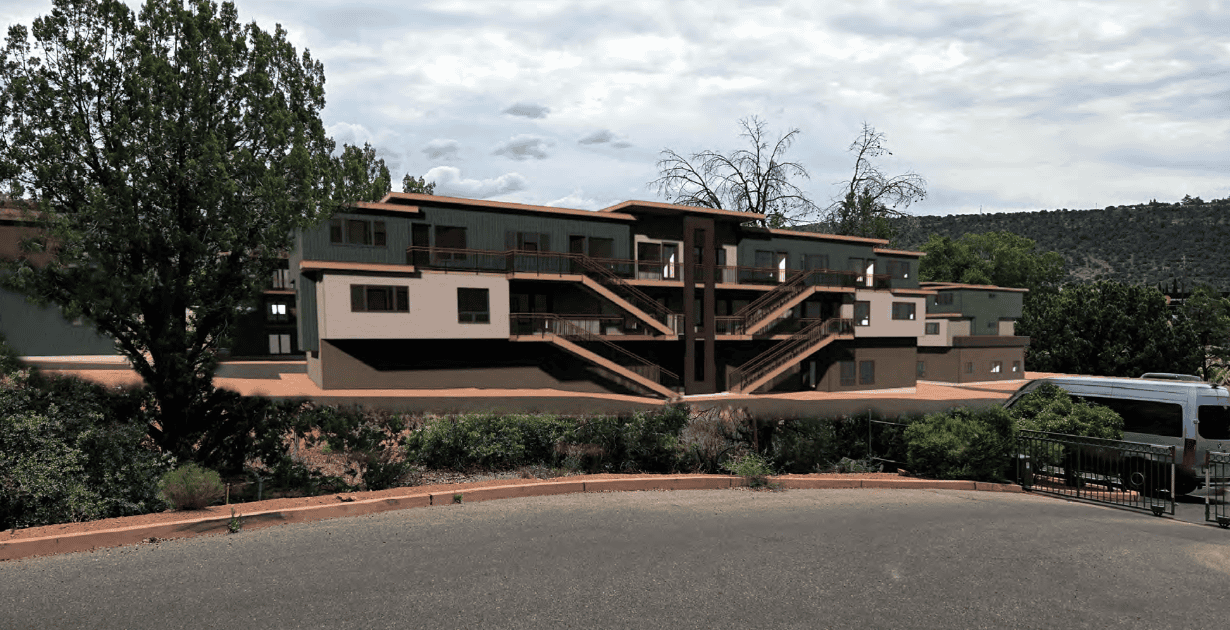BCT
Council Rejects Proposal for Affordable Housing Development

The Sedona City Council has opted not to enter into a development agreement with BCT Sedona Multifamily LLC, a housing project spearheaded by philanthropist Basil Maher. The project aims to build 54 affordable housing units at 60 Goodrow Lane. This decision came during the Council’s July 9 meeting.
Maher’s proposal included a 10-year restriction on affordability for half of the units and a 30-year restriction on short-term rentals. He also committed to self-fund the project, estimated to cost up to $30 million. Despite these offers, the City Council members felt that the benefits provided did not merit granting the requested code exemptions.
Consequently, the Council directed city staff to continue with the design review while noting that exceptions might be requested later.
54 Units for Families
The planned project would consist of seven buildings over 2.8 acres, located near The Wilde Resort and behind the future Alkemista Meadery. With a mix of one-, two-, and three-bedroom apartments and townhomes, the project aims to offer diverse housing options. A road connecting Contractor’s Road with Bennett Lane is also part of the project and contributes to the overall estimated cost.
“Only DIGAH [Development Incentives & Guidelines of Affordable Housing] policy direction is being sought today,” said Housing Coordinator Jeanne Frieder. The project still requires approval through the standard development review process by the Planning and Zoning Commission.
Maher asked for two exemptions: a reduction in setback from 20 feet to 17 feet for one building and an increase in building height from 30 feet to a range of 33 to 42.5 feet. This adjustment would facilitate underground parking and preserve open space.
“To gain extra height, BCT would dedicate seven of these units as affordable,” stated Whitney Cunningham, Maher’s attorney. “They prefer to double that height allowance to significantly increase the number of affordable units available.”
“We want to bring families back to Sedona,” Maher said. He emphasized the importance of affordable housing for local workers and hoped to alleviate some of Sedona’s housing issues. Without these increased heights, he noted, only 28 to 30 units could be built.
Maher’s attorney, Cunningham, also mentioned the need for open spaces within the residential area to attract families and maintain quality of life.
Building Height
“This process circumvents providing more crucial context for your application,” Councilwoman Kathy Kinsella said, emphasizing the importance of considering the building mass along with height.
Planning Manager Cari Meyer pointed out that early Council input would save time, as significant changes later would be unnecessary.
“It will meet massing requirements,” assured City Attorney Kurt Christianson, noting these were the only exceptions being requested.
Councilman Brian Fultz asked Maher about alternative plans if the height exceptions were not granted. “I don’t know,” Maher replied, suggesting he might abandon the project or find other uses for the property.
Vice Mayor Holli Ploog highlighted the challenges of introducing a three-story building into Sedona’s commercial corridor but acknowledged there were already similar structures nearby.
“I’ve never heard of this project before today,” Ploog said. She emphasized the need for more information before making an informed decision.
Mimi Maher and former Sedona Housing Manager Shannon Boone had discussed the Goodrow project since April, as Boone had brought it up during budget sessions earlier in the year.
“You need to give us something concrete to argue in favor of this development,” Ploog added.
“I agree,” Maher stated. He even proposed extending the short-term rental ban to 30 years if the city built necessary roads.
Whitney Cunningham noted, “The benefit to the city is 54 units for workforce housing, which current zoning wouldn’t allow.”
Affordable Units
The proposed development agreement included restrictions for renters earning up to 120% of the area median income for ten years, with a 30-year ban on short-term rentals for all units. Maher believed his self-funded program needed fewer restrictions, though he initially agreed to the 10-year term.
Cunningham noted differing stances on the restrictive period, but both sides agreed on the need to move forward without resolving this issue immediately.
“Would you consider banning short-term rentals permanently?” Councilwoman Jessica Williamson asked. Maher declined, pending completion of other project aspects.
Fultz and Mayor Scott Jablow supported height and setback exemptions but suggested extending the affordability period. Councilwoman Melissa Dunn reiterated that these details could be finalized later.
“This project exemplifies why housing is challenging to build here,” Williamson remarked, critiquing the cumbersome process.
After long discussions, Maher requested an expedited review process but withdrew after comments from city officials.
Finally, the Council unanimously voted to direct staff to proceed with the project’s design and rezoning review, acknowledging that exceptions to height and setbacks would be needed.


















